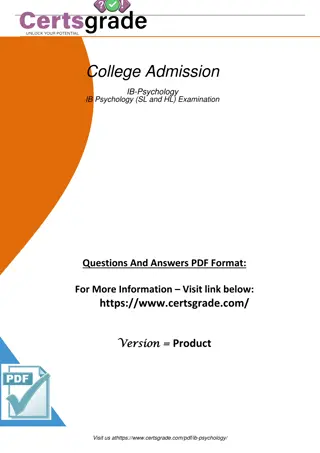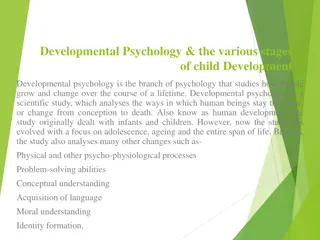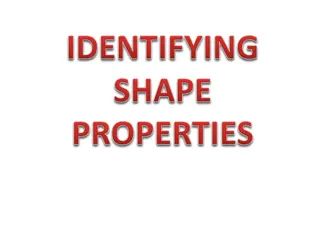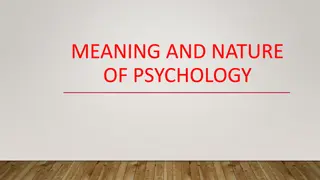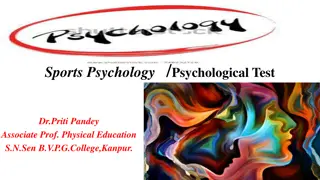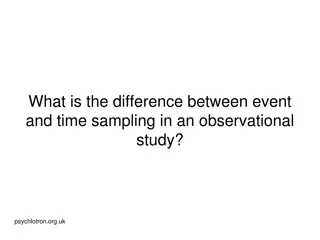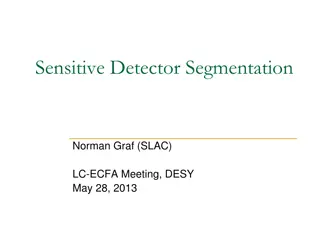
Psychological Concepts: Jung, Ego, Id, and More
Explore the fascinating world of psychology with insights into the work of Swiss psychologist Jung, as well as concepts like the conscious mind, unconscious mind, ego, id, psychopathy, attachment theory, and narcissism. Delve into the complex interplay of personalities, archetypes, and the collective unconscious in this comprehensive overview.
Download Presentation

Please find below an Image/Link to download the presentation.
The content on the website is provided AS IS for your information and personal use only. It may not be sold, licensed, or shared on other websites without obtaining consent from the author. If you encounter any issues during the download, it is possible that the publisher has removed the file from their server.
You are allowed to download the files provided on this website for personal or commercial use, subject to the condition that they are used lawfully. All files are the property of their respective owners.
The content on the website is provided AS IS for your information and personal use only. It may not be sold, licensed, or shared on other websites without obtaining consent from the author.
E N D
Presentation Transcript
Jung ASwiss psychologist who founded the school of analytical psychology. Jung proposed and developed the concepts of the extraverted and the introverted personality, archetypes, and the collective unconscious. He is best known for his exploration of the unconscious mind and his theories on the collective unconscious, archetypes, and psychological types. Concious The conscious mind includes: Fantasies, Feelings, Memories, Perceptions, Self-Awareness, Sensations, and Thoughts Essentially, it is anything that is in your current awareness. The thoughts and feelings you are experiencing at the moment, and your awareness of your current environment are all part of your conscious experiences.
Unconcious The unconscious mind is still viewed by many psychological scientists as the shadow of a real conscious mind. Cognitive psychology equates the unconscious with subliminal. The unconscious mind is often viewed as the dream center, the place where fears are processed, and where basic needs are met that override the conscious mind. Ego The conscious mind includes: Fantasies, Feelings, Memories, Perceptions, Self-Awareness, Sensations, and Thoughts Essentially, it is anything that is in your current awareness. The ego is the realistic part that mediates between the desires of the id and the super-ego. It operates on the reality principle, negotiating between the demands of the id and the limitations of the external world. The ego tries to satisfy the id's desires in socially acceptable ways.
Id The id is the primitive and instinctual part of the mind that contains sexual and aggressive drives and hidden memories. It operates on the pleasure principle, seeking immediate gratification of its desires without considering reality or consequences. Super-ego The super-ego is the moral component of the mind, incorporating the values and norms of society that are learned from parents and others. It acts as a conscience, guiding the ego to consider not just what is possible, but what is right and wrong.
Psychopathy A personality construct characterized by impaired empathy and remorse, and bold, disinhibited and egocentric traits, masked by superficial charm and the outward appearance of apparent normalcy. Sociopathy A pattern of antisocial behaviors and attitudes, including manipulation, deceit, aggression, and a lack ofempathy for others.
Attachment Theory The theory that humans are born with a need to form a close emotional bond with a caregiver and that such a bond will develop during the first six months of a child's life if the caregiver is appropriately responsive. Narcissism A mental health condition in whichpeople have an unreasonably high sense of their own importance. They need and seek too much attention and want people to admire them. People with this disorder may lack the ability to understand or care about the feelings ofothers.
Generational Trauma Psychological damage caused by exposure to a traumatic event or collection of events experienced by previous generations in a family or community Resilience The ability to cope mentally and emotionally with a crisis, or to return to pre-crisis status quickly.
Psychoanalysis A set of theories and therapeutic techniques that deal in part with the unconscious mind, and which together form a method of treatment for mental disorders. Abuse The improper usage or treatment of a person or thing, often to unfairlyor improperly gain benefit.[1]Abuse can come in many forms, such as: physical or verbal maltreatment, injury, assault, violation, rape, unjust practices, crimes, or other types ofaggression.
Archetype Personalities Carl Jung's theory of archetypes includes 12 primary archetypes that represent fundamental human motivations and characteristics. Each archetype has its own set of values, meanings, and personality traits. For example, The Innocent: Seeks safety and happiness; aims to be good and is often optimistic and pure. Meyer-Briggs Personality Test The Myers-Briggs Type Indicator (MBTI) is a widely used personality assessment tool that categorizes individuals into one of 16 different personality types based on their preferences in four key areas: Extraversion (E) vs. Introversion (I), Sensing (S) vs. Intuition (N), Thinking (T) vs. Feeling (F), Judging (J) vs. Perceiving (P)
Nature vs. Nurture The nature versus nurture debate explores the relative contributions of genetics (nature) and environment (nurture) to human development, behavior, and personality. Nature: an individual's characteristics are primarily determined by their genetic makeup. Nurture: the environment in which a person is raised shapes who they are. Parenting Styles The concept of parenting styles refers to the different approaches that parents use to raise their children. Authoritative Parenting Authoritarian Parenting Permissive Parenting Neglectful (Uninvolved) Parenting
Perception vs. Reality The concept of perception versus reality deals with the difference between how we see or interpret the world (perception) and how things actually are (reality). Self Fulfilling Prophecy A self-fulfilling prophecy is a psychological phenomenon where a person's belief or expectation about a situation or another person influences their behavior in a way that causes the belief to come true.
Mental Disorders Conditions that affect a person's thinking, feeling, behavior, or mood. These disorders can cause significant distress or impairment in social, occupational, or other important areas of functioning. They vary in severity and can be temporary or long-lasting. Moral Development Moral development refers to the process through which individuals develop an understanding of moral principles and how to distinguish right from wrong. This development occurs across different stages of life and is influenced by cognitive, emotional, and social factors.
Maslow Abraham Maslow was an American psychologist best known for creating Maslow's Hierarchy of Needs, a theory of human motivation. Born in 1908, Maslow's work focused on understanding what motivates people to achieve personal growth and self- fulfillment. Hierarchy of Needs
Erikson A German-American psychologist known for his theory of psychosocial development. Born in 1902, Erikson expanded on Freud's psychosexual stages to emphasize the social and cultural influences on psychological growth. His theory outlines eight stages of development, each characterized by a specific conflict or challenge that must be resolved for healthy psychological development
Motivation and Emotion Motivation and emotion are closely related psychological concepts that influence human behavior and experience. Motivation refers to the internal and external forces that drive individuals to pursue goals, take action, and maintain effort toward achieving objectives. Emotion refers to complex reactions involving physiological arousal, subjective experience, and behavioral responses to stimuli or events. Sleep and Dreams Sigmund Freud was an influential psychoanalyst who developed theories on dreams and their significance. He saw dreams as a window into the unconscious mind. Freud believed that dreams serve to fulfill repressed desires and wishes, allowing individuals to work through internal conflicts in a disguised form.


